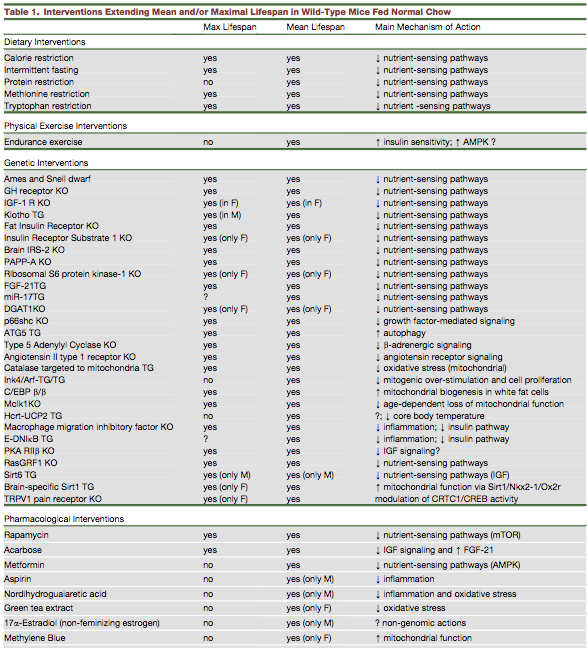Live Longer by Changing Your Diet
Aging has always been considered an inevitable process. But the discovery that the aging process itself could be ‘hacked’ has led to the concept of ‘health span’ as opposed to merely ‘lifespan’.
A long life is not necessarily marred by disability and death and specific dietary interventions in particular may promote healthy long life.

However, much of this data results from animal data as it is difficult to experiment on live humans.
The table below illustrates the results from dietary, exercise, genetic and drug interventions and their main mechanism of action.
Pay particular attention to the column ‘Main Mechanism of Action’.
This is the best guess as to how all these different interventions may increase lifespan.

Did you notice something rather striking?
Almost all of the interventions work through the same pathway — decreased nutrient sensing — which also includes decreased growth factor signaling and increased autophagy.
The main 3 nutrient sensors of the human body, which is similar to most animals are
Most of these interventions affect one or more of these pathways.
With TOR, less is more. Blocking mTOR improves protein handling, increases autophagy and enhances stem cell function. That is, from all the animal research, increased health span depends not on having more nutrients, it is having less.
Increased longevity depends on decreasing the nutrient sensors (lower mTOR and insulin, higher AMPK) at least periodically.
The most ancient dietary intervention is Intermittent fasting.
Humans have used fasting (or cleansing, detoxification, purification or whatever you call it) as a method of increasing wellness since antiquity.
Benjamin Franklin, kind of a smart guy, said “The best of all medicines is resting and fasting”.
Compared to other dietary interventions, intermittent fasting appears to be far more powerful because alone has the ability to affect all 3 nutrient sensors simultaneously, as well as stimulate autophagy and mitophagy.
Eating less frequently may significantly improve health. Most omnivorous mammals eat only intermittently.
Things changed somewhat with the agricultural revolution approximately 10,000 years ago. From a hunter-gatherer society, agriculture allowed populations of humans to stay in one area and resulted in more stable food availability.
However, there would still be seasonal variation and possibly long weeks or months where food is less available. There would also be shorter periods of time, days — weeks, where food was restricted.
Most humans ate between 2–3 times per day. Without light, it would be difficult to eat a ‘midnight’ snack in the pitch blackness. So early humans still followed a tradition of a long overnight fasting period — hence the term ‘break-fast’.
We can begin to regain some of our lost ancient wisdom by following the ancient food tradition of taking a break from eating once in a while. Give yourself a chance to digest the food you’ve eaten. Intermittent fasting.